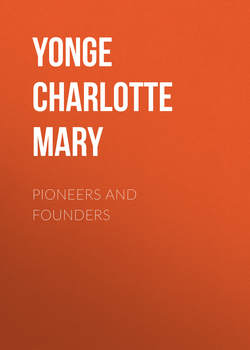Читать книгу Pioneers and Founders - Yonge Charlotte Mary - Страница 5
CHAPTER IV. HENRY MARTYN, THE SCHOLAR-MISSIONARY
ОглавлениеAgain do we find the steady, plodding labourer of a lifetime contrasted with the warm enthusiast, whose lot seems rather to awaken others than to achieve victories in his own person. St. Stephen falls beneath the stones, but his glowing discourse is traced through many a deep argument of St. Paul. St. James drains the cup in early manhood, but his brother holds aloft his witness to extreme old age.
The ardent zeal of the Keltic character; the religious atmosphere that John Wesley had spread over Cornwall, even among those who did not enrol themselves among his followers; the ability and sensitiveness hereditary in the Martyn family, together with the strong influence of a university tutor,—all combined to make such a bright and brief trail of light of the career of Henry Martyn, the son of the head clerk in a merchant’s office at Truro, born on the 18th of February, 1781. This station sounds lowly enough, but when we find that it was attained by a self-educated man, who had begun life as a common miner, and taught himself in the intervals of rest, it is plain that the elder Martyn must have possessed no ordinary power. Out of a numerous family only four survived their infancy, and only one reached middle age, and in Henry at least great talent was united to an extreme susceptibility and delicacy of frame, which made him as a child unusually tender and gentle in manner when at his ease, but fretful and passionate when annoyed.
Of course he fared as ill with his fellow-scholars at Truro Grammar School as he did well with the masters; but an elder boy took him under his protection, and not only lessened his grievances at the time, but founded a lasting friendship.
In 1795, when only fourteen, Henry Martyn was sufficiently advanced to be sent up as a candidate for a scholarship at Corpus Christi College, Oxford, and passed a very creditable examination, though he failed in obtaining the election. Eight years later, we find him congratulating himself in his journal on thus having escaped the “scenes of debauchery” to which his “profligate acquaintances” might have introduced him. Was Corpus very much changed, when, only eleven years after, John Keble entered it at the same age? Was it that Martyn’s Cornish schoolfellows were a bad set, or does this thanksgiving proceed from the sort of pious complacency which religious journalizing is apt to produce in the best of men?
The failure sent Henry back to work for two years longer at the Truro Grammar School, and when at sixteen he was entered at St. John’s, Cambridge (most peculiarly the college of future missionaries), he immediately made proof of his remarkable talent. Strange to say, although his father’s rise in life had begun in his mathematical ability, Henry’s training in this branch had been so deficient, and the study appeared so repugnant to him, that his first endeavour at Cambridge was to learn the proportions of Euclid by heart, without trying to follow their reasoning. This story is told of many persons, but perhaps of no one else who in four years’ time, while still a month under twenty, was declared Senior Wrangler.
This was in 1801, and the intervening time had been spent in hard study and regular habits, but neither his sister at home, nor a seriously-minded college friend, were satisfied with his religious feelings during the first part of the time, and he himself regarded it afterwards as a period of darkness. Indeed, his temper was under so little control that in a passion he threw a knife at a companion, but happily missed his aim, so that it only pierced the wall. The shock of horror no doubt was good for him. But the next step he recorded in his life was his surprise
